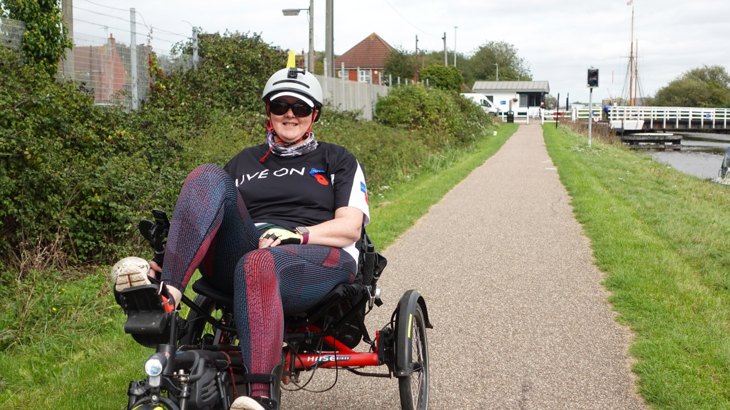RAF veteran Debbie describes the “sheer joy and freedom” of getting out on the National Cycle Network. She is sharing her story in the hope it will inspire others to give accessible cycling a try.
With her recumbent trike and the National Cycle Network, Debbie has been able to enjoy getting active in nature. Video: Kenyons
“Once I discovered accessible cycling, I realised how much fun it was. And just the sheer joy and freedom of not being restricted. Suddenly, I kind of got my independence back,” says Debbie.
“Suddenly, I could get out in nature in a way I’d been struggling with before.
“I’m managing quite complex health issues, and I think the fact that I do get out and get the fresh air and actually keep my body moving allows me to recover more quickly.”
Health and social benefits of accessible cycling
Debbie rides a recumbent trike, which places the rider in a laid back, reclined position.
She began using her trike five years ago after health conditions Ehlers-Danlos syndrome and dyspraxia meant she was no longer able to ride a bicycle.
A former dentist, Debbie worked in the RAF and NHS before medically retiring in 2014.
She was advised by her GP to work on strengthening her legs, which led her to join accessible rides with a local charity.
Debbie says she has now regained her independence using the National Cycle Network around her hometown of Gloucester to visit local amenities.
But more than this, getting out on her trike has helped her find a new freedom and enjoy being surrounded by nature in a way she would otherwise be unable to.
‘I’d definitely say give it a go’
Debbie says the National Cycle Network has been a key part of her journey.
Having first challenged herself to ride along the Bristol and Bath Railway Path, Debbie has completed several challenges on her trusty recumbent trike and won many accolades.
Debbie’s message is to anyone thinking of taking up accessible cycling:
“It's so valuable. If you’ve just got that little thought that it might be worth trying. There are accessible cycling groups all over the country – I'd definitely say, give it a go.”

Debbie has found independence on her local stretches of the National Cycle Network. Credit: Rachel Sutherland
Ensuring the National Cycle Network is inclusive and accessible for all
Kierson Wise, UK Programme Manager for Accessibility and Wayfinding, said:
“Debbie’s powerful story shows the importance of providing accessible spaces and breaking down barriers to ensure that everyone can feel the multiple benefits of cycling, walking and wheeling.
“The National Cycle Network is so much more than a piece of infrastructure – it provides the freedom to move, connect with essential amenities and other people, and experience the healing power of nature.
“We are thrilled that Debbie has shared her story and hope it inspires others to give cycling a try. Meanwhile, we will continue our work to ensure the National Cycle Network is inclusive and accessible to all.”
Support the Network
The National Cycle Network is a free, accessible space that helps people like Debbie to stay active. But this national asset requires constant care and costly maintenance. Please give £10 today. Your donation could help the National Cycle Network transform many more people’s lives for generations to come.
Spanning more than 12,000 miles across the UK, the National Cycle Network is waymarked by a number in a little red square.
It's affectionately known as the spine of walking, wheeling and cycling in the UK, and a beloved part of our active travel heritage.
Our staff and volunteers work to care for and improve this vital infrastructure, while championing a long-term vision for its future, which includes ensuring the paths are accessible for everyone.
With her story, Debbie hopes to inspire others to find new ways of getting active.






